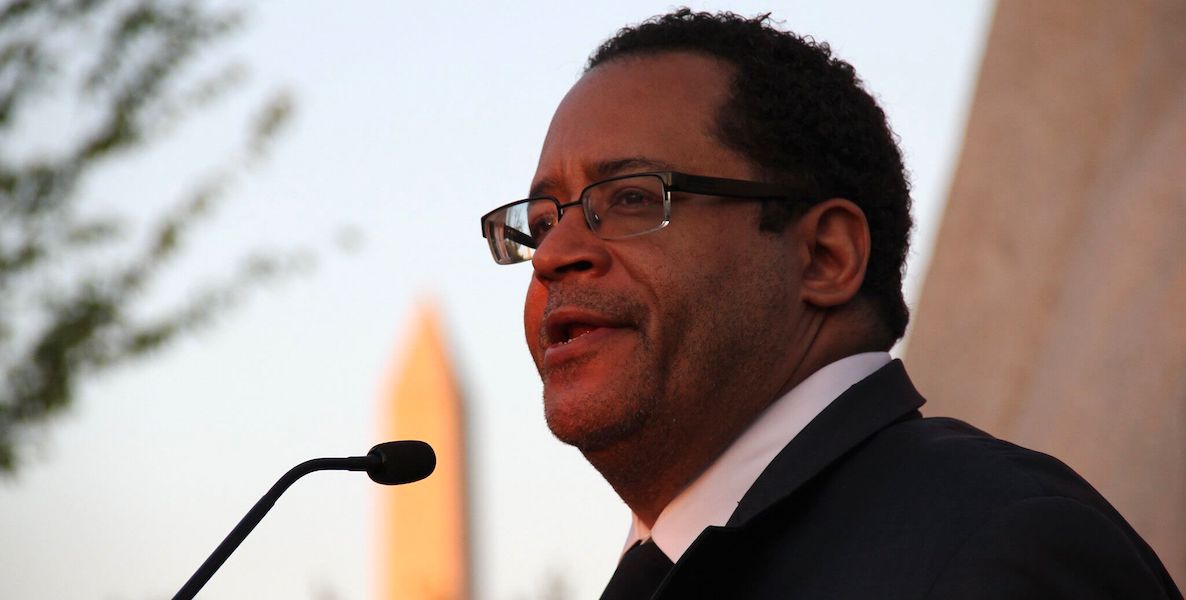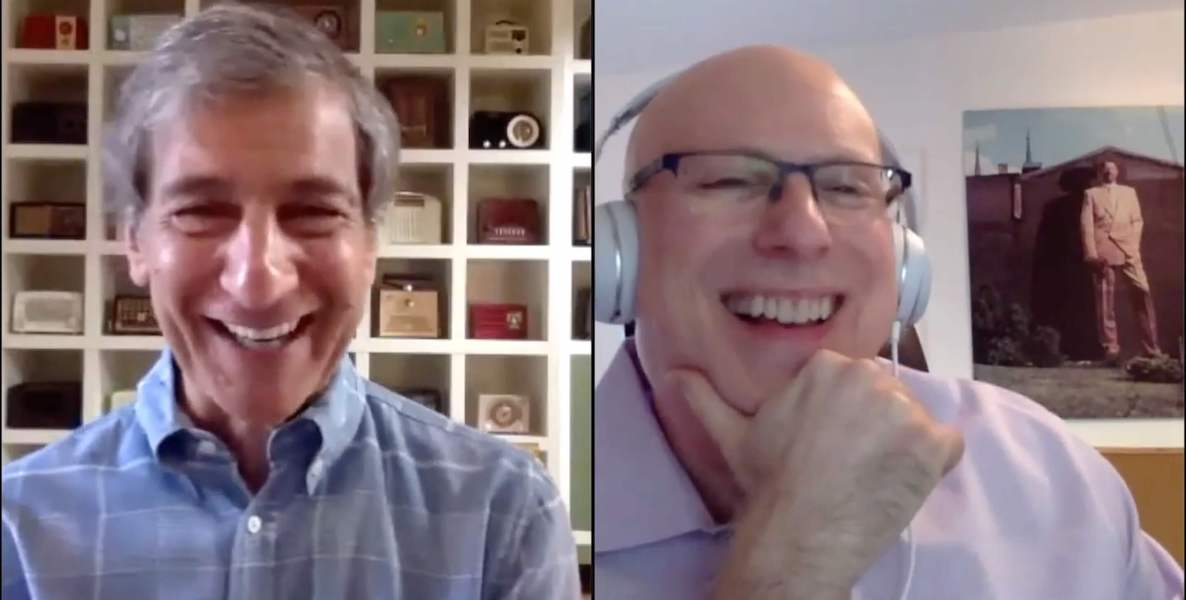The day before Election Day, I met up with two of my favorite dudes, who happen to be two of the smartest thinkers on race and culture today. We ![]() gathered at West Philly’s Decisions barbershop, opened 30 years ago by young head-cutters Ty Martin and Suran Casselle—an iconic spot where Black men have long gathered to talk life, hoops and, uh, trash.
gathered at West Philly’s Decisions barbershop, opened 30 years ago by young head-cutters Ty Martin and Suran Casselle—an iconic spot where Black men have long gathered to talk life, hoops and, uh, trash.
We were filming a segment for the forthcoming Mike Tollin-produced documentary on the way NBA athletes have fueled social change in this moment of racial awakening.
Citizen contributor Dr. James Peterson was the first to arrive, and Dr. Michael Eric Dyson was close behind. Dyson, whose new book, Long Time Coming: Reckoning with Race in America, is organized around moving open letters penned to the martyrs of our original sin, from Emmett Till to Elijah McClain, the heartbreakingly gentle 23-year-old who would play the violin to soothe stray cats.
Let Dyson take it from here:
Someone called the cops on you, saying you appeared suspicious as you walked home from a convenience store in the summer of 2019, waving your arms. You wore a ski mask because your anemia made you get cold easily. When the cops arrived, you begged them to truly see you: “I am an introvert, please respect the boundaries that I am speaking.” You told them you were on your way home and asked them to stop being so aggressive…The string of words that flowed from your mouth as the cops brutalized you is at once sad, because you tried your best to show that you were a meek and mild soul, and enraging, because it didn’t matter what you said. They were hell-bent on smashing your body into no-thing-ness, into not-there-ness…You told them, “I’m just different. That’s all. I’m so sorry.” You told them, “I have no gun. I don’t do that stuff.” You promised, “I don’t do any fighting.” Then you pleaded, “Why are you attacking me? I don’t even kill flies. I don’t meat!”—as if your penchant for peacefulness and your dietary discipline might somehow convince them that your life was worth sparing. But Elijah, you quickly insisted that you didn’t have a sense of moral superiority over those who disagreed with your choice: “But I don’t judge those who do eat meat.” You begged them to forgive you. No, my lovely young friend, it is they who need to beg your forgiveness and be held accountable.
This is classic Dyson; for all his insightful commentary, for all his connecting of cultural dots to advance an argument, and for all his speaking of truth to power (as when he upbraids others in the Black church for their homophobia), there is never anything bloodless in Dyson’s take.
Every character upon whom he fixes his literary gaze, like Elijah McClain, is flesh and blood, someone who breathes and loves, and whom other human beings love and need.
That’s why we asked Dyson to close out our third annual Ideas We Should Steal Festival, because he has a way of speaking hard truths in a way that nonetheless lead us to hope. And we need us some hope in these times.
For now, here’s a snippet of our conversation that day. I had noticed that Dyson dedicated his book to one LeBron James:
To: LeBron James
Greatest basketball player on the globe
In the conversation for G.O.A.T.
Founder of the I Promise School for at-risk children
Media mogul
Global business magnate
Transformative Philanthropist
Outspoken social activist who refused to shut up and dribble
Started at the bottom, now you’re here
For standing with Black people without excuse or apology
And for embracing people of all races around the world
“Black men, Black women, Black kids, we are terrified…You have no idea how that cop that day left the house…You don’t know if he had an argument at home with his significant other. You don’t know if his kids said something crazy to him and he left the house steaming. Or maybe he just left the house thinking that today is going to be the end for one of these Black people. That’s what it feels like. It hurts.”
—LeBron James

Larry Platt: Do you make the case that LeBron is the most impactful social change agent athlete we’ve had—even more than Ali?
Michael Eric Dyson: The most impactful ever, no question. And let me tell you why. Ali, over the three years he faced imprisonment over his refusal to fight in Vietnam and was barred from fighting—they snatched his crown, and we never got to see him in his heyday. That’s an amazing thing to think about. So he responded in reaction to that. LeBron has been proactive at the height of his career, at the height of his fame, and he’s leveraged everything he has. [Michael] Jordan had to wait, what, 20 years after he left the game to write a $100 million check now? No disrespect to MJ, but LeBron is doing all this at a cost that’s very interesting to me.
LP: And, unlike Ali, I guess you’re saying, LeBron wasn’t driven to act by his personal victimhood, by something that was done to him?
MED: That’s right, LeBron’s racial empathy is off the charts. But to me, it’s in concert with what he’s been doing all along. He’s been changing the game in a way Jordan never thought to. By developing the first truly “Big 3,” [when James recruited fellow stars Dwyane Wade and Chris Bosh to play with him in Miami] they consciously coupled—if we can borrow the Gwyneth Paltrow term—and changed the economics of the game in a very fundamental fashion. Black men in control of their destinies in a game whose coffers are filled by them.
LP: He basically declared himself the general manager of the team. It was like a laborer saying, Okay, I’m management now.
MED: And in the process he has reversed so many of the usual racial rituals. There’s nobody in his class, on the court, or as a change agent off it.
LP: We’ve talked about this before. My concern is that the racial awakening after the execution of George Floyd will fade before we get to real systems change. When it comes to social justice, it always feels like Groundhog Day.
MED: But see, Black folk are used to repetition. It’s always circular. You start, white folk get interested, then they fall out of interest. We then leverage what we have at that point. We keep moving. So Black people and other allies have to keep moving and keep strategizing even during the moments when there’s a lull. You keep talking, you keep planning. Then when it catches fire among white folk, you capitalize.
![]() But let’s also put a little burden on white people. George Floyd? Like no disrespect to Mr. Floyd. But George Floyd is what awakened you? Not Emmett Till? There was a thing called slavery, don’t know if you heard about it? There was a thing called Reconstruction that was quickly snatched from under the feet of Black people, read Black Reconstruction by DuBois, 1935.
But let’s also put a little burden on white people. George Floyd? Like no disrespect to Mr. Floyd. But George Floyd is what awakened you? Not Emmett Till? There was a thing called slavery, don’t know if you heard about it? There was a thing called Reconstruction that was quickly snatched from under the feet of Black people, read Black Reconstruction by DuBois, 1935.
Look at what happened with Jim Crow, look at what happened with separate but equal, look at what happened with sharecropping, where Black people were getting systemically ripped off, look at the book Slavery By Another Name by my man Douglas Blackmon. In other words, there has been so much information and knowledge but you can never predict what will kick off a movement.
LP: How do we insure that the opportunity of this moment isn’t squandered?
MED: The thing about that is, this younger generation says that’s a question white folk gotta answer, right? ‘Cause, they say, we’ve been doing our job. We’ve been marching for social justice, we’ve been addressing democracy. But when you have the resurgence of white supremacy and white nationalism and white folk are saying, hey, what else can we do? Well, go home and tell your white people to stop that crap. That’s what you can do.
But let’s give credit where credit is due. To me, this is a different generation of white folk.The reason this is the biggest set of social protests in history is because a bunch of white folk got involved as well. And white folk not just merely on the street, but their bodies at stake. I talk about it in Long Time Coming —their bodies are at stake in a way they weren’t before. Look at the two people who got killed in Kenosha, in the Black Lives Matter protest — white men! And the third who got shot.
So there is a level of investment and empathy that translates white concern into something that’s very tangible, that is actionable, and that demands we form a coalition to get things done. To me, that’s something to celebrate and acknowledge and not just pass off as just another cycle. This is something layered, something different than what we’ve seen before.
Header photo by Jean Song / Medill News Service / Flickr



